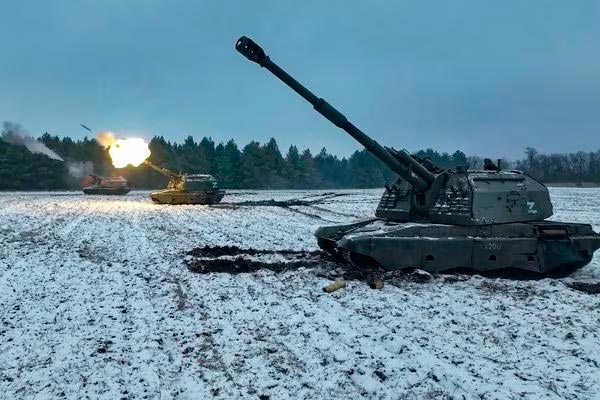It has been almost twelve months of war in Ukraine. Enough time to understand the fundamental tendencies of this inter-imperialist conflict and its far-reaching consequences for the class struggle, the economy and international relations. Here there are some of the most important conclusions:
1.-Western imperialism has not achieved its objectives. The strategy designed by the US State Department has failed: Russia is neither defeated nor isolated and economic sanctions have not succeded in twisting the arm of Putin’s regime. While Ukraine's GDP has shrunk by 30.4 per cent in 2022, the Russian economy contracted by only 2.5 per cent, a far cry from the 10 per cent drop that Western agencies were forecasting in February 2022. Even the IMF has upgraded its forecast for Russia, and expects its GDP to grow by 0.3% in 2023.
The data emerging in the most rigorous newspaper articles are conclusive: "Between 24 February and 15 December, the EU imposed 10,300 sanctions on Russia. It is now on its tenth sanctions package. The sanctions were meant to make Russia lose the war, or at least the energy war. German foreign minister Annalena Baerbock said their purpose was to 'ruin' Russia, and Commission president Ursula von der Leyen said the aim was to 'dismantle, step by step, Russia's industrial capacity'. But Russia's economy has not collapsed. Its hydrocarbon export revenues have increased by 28% (...) The coffer that sustains Moscow's war has not been emptied..."[1].
Another article published on 31 January in The New York Times stresses these points: 'Russian trade appears to have largely recovered to the level it was at before the invasion of Ukraine last February (...) In part, that may be because many nations have found it difficult to leave Russia. Recent research showed that less than 9% of the companies based in the European Union and the G-7 would have sold one of their Russian subsidiaries. And shipping firms have seen a surge in fleet activity that may be helping Russia export its energy, apparently circumventing Western restrictions on such sales (...) Overall, Chinese exports to Russia hit a record high in December, helping to offset a sharp drop in trade with Europe. Apple and Samsung phones also appear to be starting to find their way back to Russia, diverted through friendly neighbouring countries (...) And China has increased semiconductor exports to Russia, although Russia's total chip imports remain below pre-war levels"[2].
2.- The bloc of Western allies is not any stronger today than it was a year ago. Some of the US's preferred partners, such as Turkey, India and Saudi Arabia, have clearly swung towards the adversary. These countries' trade relations with China and Russia have soared exponentially. Russia remained India's largest oil supplier in December, with a record 1.25 million barrels per day (bpd). For the first time, it overtooks the traditional sellers of crude to India, Iraq and Saudi Arabia, accounting for 25% of all crude oil imported by India, the world's third largest oil consumer and importer[3].
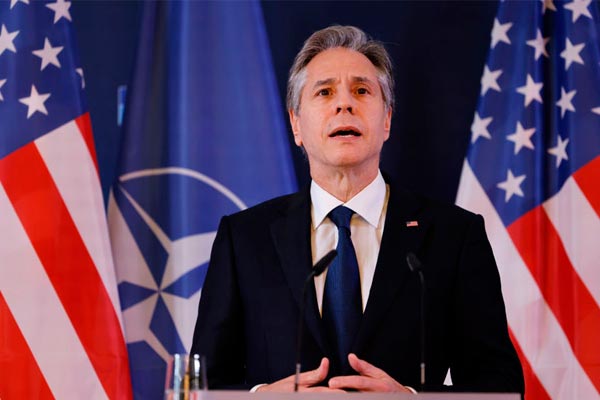
Chinese purchases of Russian oil averaged 1.72 million barrels of oil in 2022, 8% more than in 2021, surpassing Saudi Arabia. And Saudi Arabia exports 25% of its oil to China, a figure that is set to continue growing. Not only has the former US ally rejected Biden's demands for OPEC to increase the price of oil. Last December, during Chinese President Xi Jinping's visit to Riyadh, Saudi Arabia and China agreed to upgrade their relations to the status of a strategic partnership. Most importantly, a substantial part of the exchange will be carried out using the yuan, which represents a further step in the fight against the dollar, until now the hegemonic currency in international trade.
3.-The Western bourgeoisie, both in the US and the European Union, has been unable to generate a mass mobilisation in favour of its imperialist agenda in Ukraine, while those calling for an end to sanctions on Russia have gained a very strong foothold in the Czech Republic, Germany and Hungary. The majority of public opinion in Europe does not support the conflict escalation which involve sending more military aid to Zelensky’s regime.
4.- The Ukrainian government's lack of credibility, despite the war propaganda that the Western media insists on a daily basis, is a serious problem for the US and its allies. The idea that Zelensky's government is fighting for democracy and national liberation in Ukraine is being challenged: its links to fascist organisations and its celebration of Ukrainian supremacist nationalism are so evident that efforts to whitewash its image are still not going far enough.
5.- The Russian army's territorial conquests in Ukraine are being consolidated. A careful reading of the reports and reflections of the most serious military specialists on the Western side reveals what is going on. According to US Chief of Staff General Mark Milley, Ukraine has achieved what it could militarily. More is not possible.
6.- The Ukraine war is the touchstone test of the struggle for hegemony in Europe and the world. The decline of US imperialism and the economic and military setbacks it has suffered in the last decade - which were highlighted by the withdrawal of the US Marines from Kabul - launched Washington into a fierce battle against China. So far, however, its efforts have been to no avail. Chinese state capitalism has shown great strength.
7.- During the outbreak of the pandemic with its zero covid policy and in the global economy, China's resilience to the onslaught of its competitors is beyond doubt. In 2022 its trade surplus with the world registered a new record: 877.6 billion dollars, 29.7% more than in 2021, and with regards to the US it reached 404.1 billion dollars, 1.8% more than in the previous year[4]. The advances in artificial intelligence, in the production, processing and marketing of essential raw materials, in the domination of numerous supply chains, in new productive branches such as the electric car - China controls 77% of world battery production and is the largest market for electric vehicles, with 52% of world sales in 2021 -, in the space race and in its military machinery... what a devastating blow for the US. Chinese imperialism has not needed, for the moment, to send troops outside its borders to challenge the US colossus and displace its leadership in many domestic and continental markets.
8.- Washington is the focus of the greatest economic, political and military instability in the world. The Biden administration, celebrated by the reformist left as a champion of progressivism and democracy, has launched an aggressive protectionist, militarist and nationalist agenda. In fact, it has deepened all the previous tendencies of Trumpism to a much sharper level.
9.- By imposing a general rearmament on all NATO countries, starting with Germany, his plans have gone too far. Japan recently signed agreements with the United States and the United Kingdom for mutual military assistance in any scenario, and proceeded to approve a rearmament package that will double its defense spending over the next five years to $314 billion, the 2% of its GDP. Japan will become the third country that spends the most on weapons in the world, only behind the United States and China. And the argument the Japanese government has put forward to justify this historic move is clear: the threat posed by China in the Pacific.
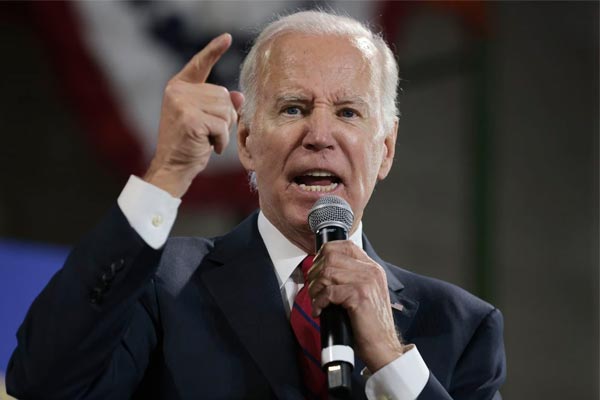
10.- If Asia is the key stage in this battle for supremacy, the old continent is no less so. Washington's intention to discipline Europe, and especially Germany, is leading to an economic hecatomb. The German industry is in a recessionary phase, suffering high production costs for crude oil and gas imported from the US and other markets at four times the price of Russian energy. Germany's energy bill has grown by €124 billion in 2022, which is 31% higher than in 2021. The country's chemicals sector, the most exposed to rising energy costs, expects production to fall by 8.5% by 2022, according to industry association VCI, which warns of "huge structural changes in Germany's industrial landscape".
11.- Divisions in the German ruling class are evident and are set to deepen in the coming months. The SPD-led government is corroded by growing contradictions. If it continues to face the immediate future with the submissiveness it has shown so far, it will only contribute to deepening the crisis in its economy while the US benefits from the trade war that has unceremoniously launched. That is why a sharp turnaround in Germany's orientation cannot be ruled out.
12.- The imperialist war is the ultimate expression of the impasse in which the capitalist mode of production finds itself. Studies of inequality and the concentration of obscene wealth in the hands of a minority of capitalist oligarchs provide a fairly accurate picture of the world. It’s not just us, revolutionary Marxists, who say that, but the reports of the agencies of international capital say so.
David Malpass, president of the World Bank, in presenting the World Bank's world outlook report said: "Emerging and developing countries face a multi-year period of slow growth driven by a heavy debt burden and low investment; at the same time, global capital is being absorbed by advanced economies facing extremely high levels of public debt and rising interest rates. The low level of growth and business investment will exacerbate already devastating setbacks in education, health, poverty and infrastructure, as well as the growing demands of climate change"[5].
13.-The war in Ukraine is not the cause of the global crisis of capitalism, but it has contributed to making it more virulent and widespread. The shake-up in the material basis of the system and the loss of its inner balance, is manifesting itself in the political superstructure, a phenomena whose precedents go back to the 1930s. The widespread divisions in the ruling class reflect the degree of social and political polarisation that has been reached. The tendencies towards the extreme right, Bonapartism and totalitarianism are growing in important segments of the world bourgeoisie. Trumpism and Bolsonarism are no accidents, nor are the turns to the right and left of broad strata of the middle classes, hard hit by the crisis. The cracks in bourgeois parliamentarism and in the traditional parties of the conservative right are part of the same phenomenon. Closing our eyes to developments that are rooted in the breakdown of the system is a serious mistake, but it is just as wrong to minimise or despise the growing response of the workers all over the world and the prospects of a fierce class struggle that is going to become a dominant fact.
14.-The strike wave in Britain and France shows the strength of the workers' movement when it starts up and its objective power as well. The insurrection of the masses in Peru against the coup d'état shows that the conditions for the socialist transformation of society are ripe, but they always run aground at the same point: the absence of a revolutionary leadership equal to the historical needs.
What to expect in the near-term war scenario
There is no doubt that Putin and his General Staff's initial calculations were wrong. To think that they would quickly sweep away the Ukrainian army and force the liquidation of the Zelenski government, even promoting a military coup, was out of place. They should have concluded better than anyone that the US would not leave the way clear for such an outcome.
Washington has been promoting this war for a long time. Its eagerness to encircle Russia with a bloc of former Warsaw Pact countries assimilated into NATO; its insistence on breaking the Minsk II agreements; arming and training the Ukrainian army in the battles raging in the Donbas since 2014 and its determination to bog Russia, and indirectly China, down in a never-ending conflict to secure its dominance on the European continent, explain why it has reached the current point.
It is also necessary to insist that Russian troops, including Wagner's mercenaries, are not fighting for people's democracy or communism, nor fighting Nazism neither. The latter is nothing more than a decoy by the regime to maintain social support within Russia, connecting with the historical memory of the war against the Nazi invasion in 1941. The imperialist interests of Putin and the Russian capitalist oligarchy are obvious - the Donbas is a key area for mineral reserves, titanium, zirconium, strontium, lithium, uranium, oil... - and they wrap them up in defensive and nationalist arguments. As a consummate anti-communist and representative of Great Russian chauvinism, Putin made it clear that he refused to consider Ukraine as a nation entitled to independence. For this reactionary nationalist, the crime committed by Lenin and the Bolsheviks was to allow Ukraine to exercise its right to self-determination.
The US and Western allies have provided Ukraine with military aid that may exceed $200 billion in just eleven months. This is unprecedented. Therefore, thinking that Zelenski is waging a war for national freedom is utterly absurd. This puppet of the US imperialism, who has enriched himself and his gang with this manna, does not give a damn about the suffering of his people.
Yet all this support has not changed the correlation of forces in the main. In November, Russia withdrew from the city of Kherson in order to reorganise its troops and has managed to regain the initiative it had lost. It has fortified its positions and secured its supply lines from the famous Ukrainian precision-guided artillery provided by the US. Also, Russian troops are making progress in the Dombas. The seizure of Soledar and what is happening in Bajmut is a qualitative leap.
Russia has ensured that the battle is now on its terms, forcing Ukraine to commit some of its best troops and resources to brutal fighting in which the Russian army is playing second fiddle: the burden is being carried by Donbas militia forces and Wagner mercenaries. German intelligence has acknowledged more than 100 deaths per day in the Bajmut area alone. At the same time, Russia's bombing campaign on energy infrastructure is making the situation for Ukraine much more complicated.
In recent weeks Washington and its satellites (Britain, Poland, the Baltics, etc.) have been openly proposing a military escalation. They argue that it is possible not only to defeat Russia, but to push it back from the whole of Ukraine and even expel it from Crimea. To achieve this they propose sending heavier and more offensive weapons, with the focus on German Leopard tanks and US Abrams. All this with the warmongering chorus of the bourgeois press and the EU bureaucracy unleashed.
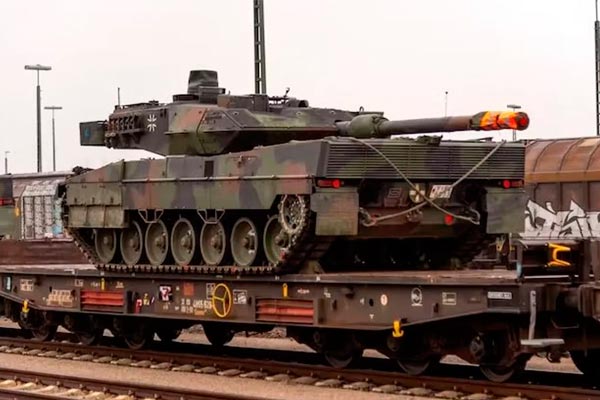
But let's be serious. The idea of defeating Russia with this material is probably not one that any NATO general believes. To began with, it is not conceived by the US Chief of Staff who, as mentioned above, already argued in November that Ukraine would not be able to make much more progress after the withdrawal from Kherson and that negotiations would have to be considered.
Secondly, Ukraine would need much more than tanks not only to drive Russia out, but also simply to hold positions as they are now. It needs more troops, which is why Zelensky is already putting a new recruitment on the table. He has been forced to toughen measures to make this possible (at gunpoint in many cases) and to maintain discipline on the frontline (including increased prison sentences for soldiers who disobey orders). But it is not clear where he is going to get the tens of thousands of men needed for this offensive.
He needs weapons of all kinds, but not only that. After depleting Soviet stocks, he is receiving vehicles, guns and ammunition of many different types. This is a logistical nightmare that, sooner or later, will show its limits. As has happened in Bakhmut, where Ukrainian withdrawals for lack of ammunition have been noted, the problem can be replicated.
For an offensive of the kind Washington is talking about, Leopards are not enough; entire NATO divisions are required. And, in order to keep a sense of proportion and avoid propaganda, it is necessary to assess the real gap between US aggressiveness on all world scenarios and its real capacity to intervene with troops.
Behind this provocative attitude of imperialism there are different factors that combine. On the one hand, to respond to the setbacks on the battlefield and to continue the war propaganda. On the other hand, to put the focus back on Germany. However, Germany is already second only to the US in providing military aid to Ukraine. For Washington it is clear that this is not enough. Berlin has to make amends for its business dealings with Russia and China and prove that it is a "trustworthy guy" by putting itself at the forefront of the war.
This is what is happening in the public arena. Nonetheless, while Washington is in full provocation mode, the CIA director was secretly meeting with Zelenski to do two things: tell him what they know about the Russian plans and, more importantly, tell him that they do not know how much longer they will be able to maintain the current level of aid. He partly blamed this on the new Republican majority in Congress, so they may be anticipating a possible Republican blockage of more funds.
It is impossible to separate the pressures on Germany from the clashes with the US over Washington's protectionist trade war. It is part of the divisions that run through Western imperialism everywhere: within the US, between the EU and the US, within the EU itself....
In recent months, Scholz has been wriggling and dodging over the issue. But the window is shrinking fast. Within his government, the Greens have become the voice of Washington, as in the past. The resignation of the defence minister was the graphic image of these fractures. The choice of her replacement, Boris Pistorius, an SPD apparatchik chosen by Scholz to cope with renewed pressure from Washington, has not substantially changed the scenario. Finally, Germany has said it will send the Leopards, some fifteen of them, in a few months' time. The Spanish government has also expressed its desire to send... the scrap metal that has been stored at the Zaragoza base. Is it possible that this material could be used to turn the war decisively and wrest control of the territories that Russia already dominates and fortifies from Russia?
The debate has extended to sending US F-16 fighter jets and pressuring Latin American countries to supply part of their old Russian arsenal to Ukraine. But these projects have hit a wall.
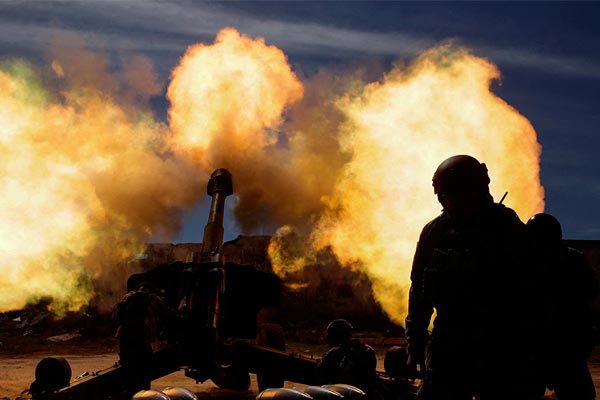
The Ukrainian government is under severe tensions, which are coming to the fore. The ongoing corruption scandals around Zelensky are a symptom of the decomposition and internal divisions that are developing in the face of enormous difficulties on the battlefield. It is clear that after sabotaging the Istanbul negotiations, the conditions for peace are now much worse for Ukraine. Time is passing, and it is passing in Russia's favour.
The Russian army's progress in the Donbas does not necessarily mean that the war will end soon. The advances are coming at the cost of heavy fighting against positions fortified by Ukraine over eight years, and each town taken opens the door to another fortified town.
For its part, Washington cannot afford to lose and will continue to support the Ukrainian army in any way it can. It is true that, on the one hand, this intervention is "cheaper" than putting its own troops on the ground. On the other hand, what the White House faces is funding the Ukrainian war at a very high economic and political cost, which could end up causing a rift in the allied bloc.
What might have been advantages for Western imperialism in recent months are vanishing by the day. When Putin claimed in early January that things were going "positively", it does not seem that he was engaging in propaganda.
Notas:
[1] Imperios combatientes. La gran ceguera
[2] Rusia evita los castigos occidentales, con la ayuda de amigos
[3] India compra a Rusia más de un millón de barriles diarios de petróleo
[4]El superávit comercial de China aumenta a $ 877.6B a medida que crecen las exportaciones
[5]La desaceleración abrupta y prolongada golpeará con fuerza a los países en desarrollo






